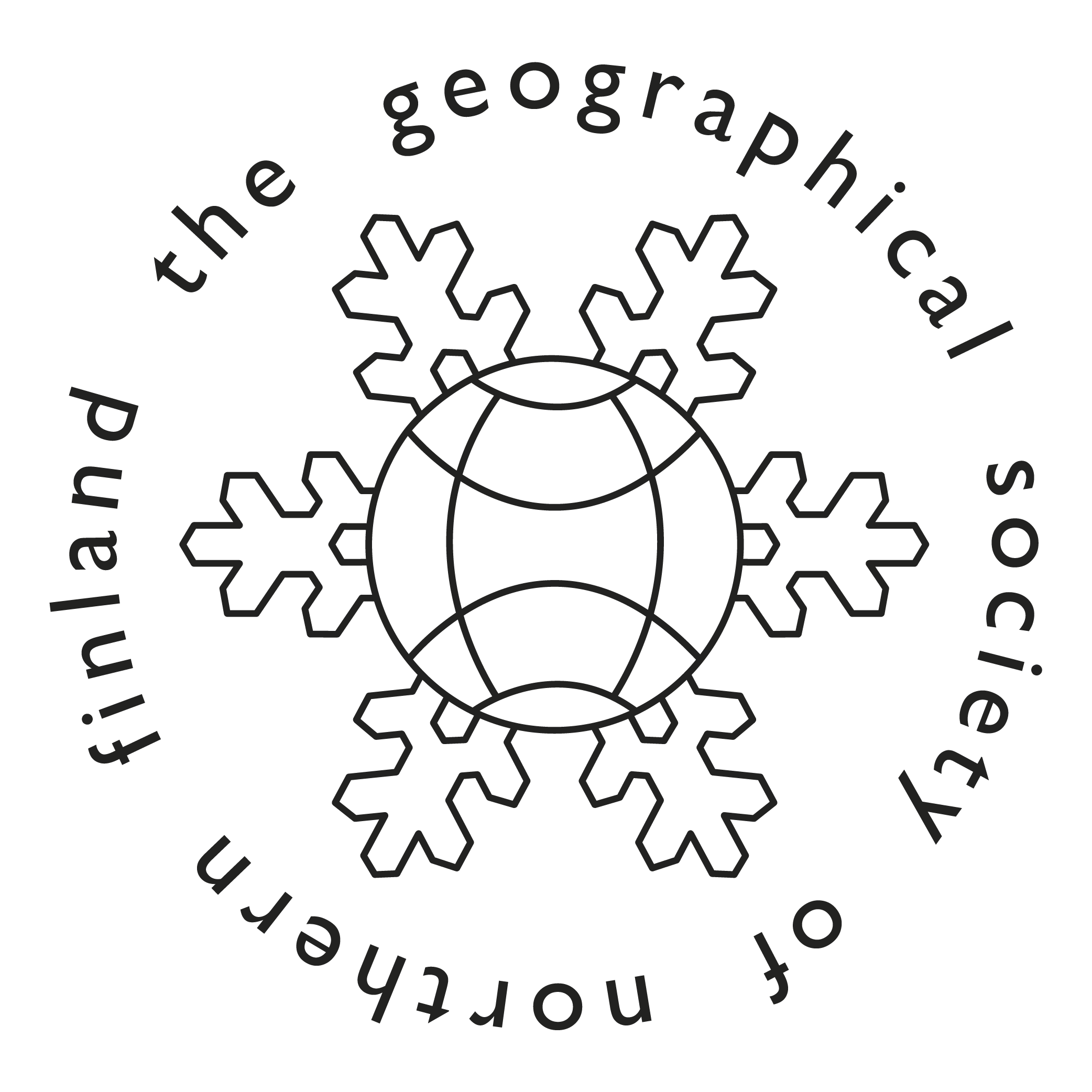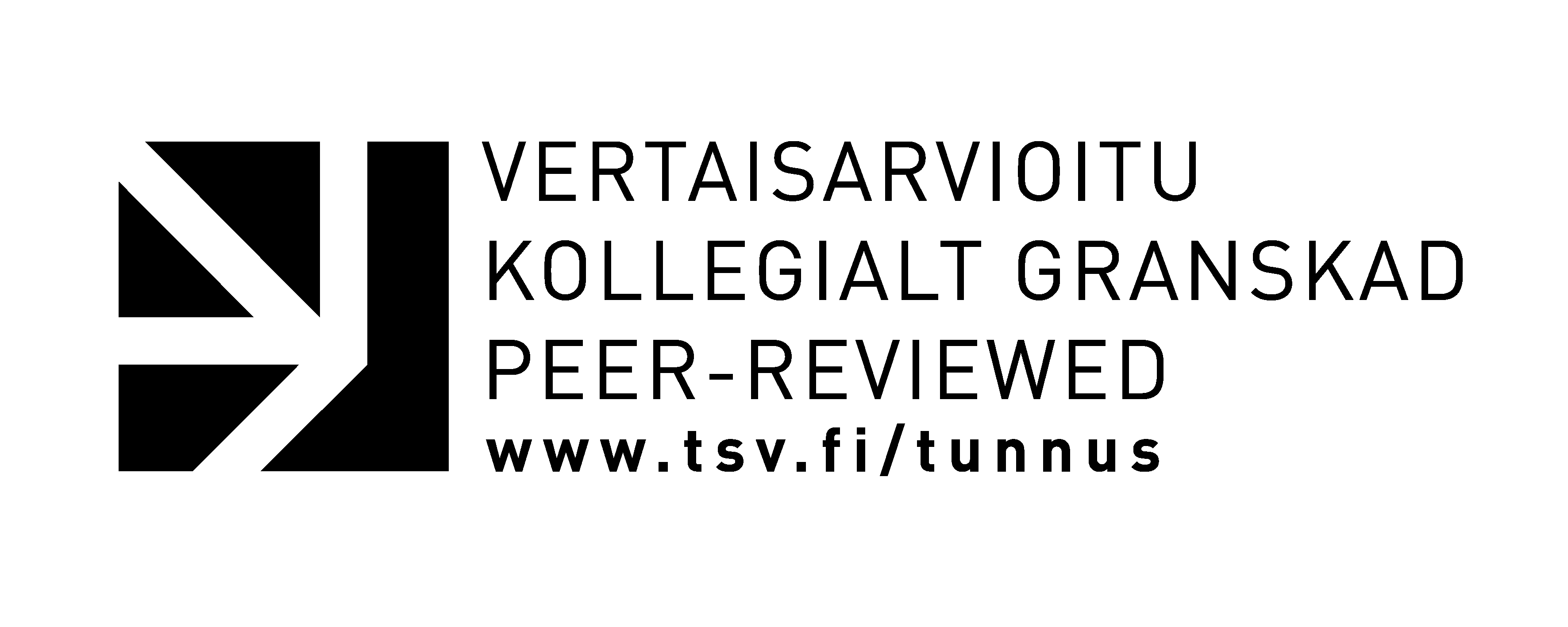Call for Papers - Addressing global change in northern environments: insights from spatial data and analysis
Nordia Geographical Publications Theme Issue – Call for Papers
Addressing global change in northern environments: insights from spatial data and analysis
Alun Hubbard, Eirini Makopoulou & Henriikka Salminen (eds.)
The Geographical Society of Northern Finland and the Geography Research Unit at the University of Oulu are pleased to announce a call for papers for Nordia Geographical Publications’ Theme Issue on "Addressing global change in northern environments: insights from spatial data analysis". Nordia Geographical Publications is a peer-reviewed, non-profit, open access academic journal focusing on contemporary interventions in Geography.
While change is a fundamental characteristic of the natural world, it is now universally recognized that humans are also potent agents of change and are altering environments and ecosystems from micro to global scales. This is particularly true of northern environments, where climate warming over the last five decades is almost four times the global mean (Rantanen et al. 2022; Serreze et al. 2000; IPCC 2021), and where infrastructure development (Hjort et al. 2022), natural resource extraction (Hovelsrud et al. 2011), socio-economic transformations (Hovelsrud et al. 2011; Serreze et al. 2021) and widespread pollution (Turetsky et al. 2020) have led to unprecedented ecological responses such as biodiversity loss and ecosystem degradation (ACIA 2005; Bjerke et al. 2017). These changes cut through the entire northern biosphere and its myriad dimensions impact on ecosystems, biodiversity, indigenous livelihoods and overall sustainability. These changes are evidenced across the Arctic and Boreal regions (Westerveld et al. 2023), including marine (Sumata et al. 2023) and coastal environments (Irrgang et al. 2022), terrestrial (Myers-Smith et al. 2011) and peatlands (Fewster et al. 2022; Könönen et al. 2022) as well as freshwaters (Koch et al. 2022; Lau et al. 2022) from specific species responses (Antão et al. 2022) to large scale biotic interactions (McKinney et al. 2022). Changes in northern environments also have far-reaching impacts on lower latitudes through, for example, regional moisture uptake and atmospheric circulation (Bailey et al. 2021), the global carbon cycle (Schuur et al. 2015) and sea-level rise (e.g. Box et al. 2022).
Acknowledging the role of human-induced change in northern environments is key to shaping strategies for conservation, sustainable resource management and mitigating the detrimental impact of human activity on natural systems. To address the prescient challenges facing northern environments requires a unique set of analytical skills and a toolbox capable of linking and interrogating diverse datasets from a myriad source on a variety of spatial and temporal scales.
This theme issue aims to bring together research and advancements that explore the challenges and opportunities posed by global change in northern environments, with a specific focus on spatial data and spatial analysis. We invite research papers, reviews, case studies and perspectives that address the broad theme of the causes and consequences of northern environmental change and encourage submissions that explore a wide range of topics, including:
- Spatial modelling of environmental change in northern regions
- Remote sensing approaches for monitoring and assessing environmental change
- Geospatial analysis of land-use and land-cover dynamics across northern environments
- Spatial-temporal analysis of the impact of climate change on ecosystems and biodiversity
- Geospatial technologies and tools for sustainable resource management in northern regions
- Spatial analysis of infrastructure development and its environmental consequences
- Data infrastructure and interoperability for managing and analysing diverse data sources
- Geovisualization and spatial communication to support decision-making in northern environments
The contributions can take the form of:
- Peer reviewed research articles (ca. 5000–7000 words), academic essays or review articles (ca. 3000–6000 words).
- Editorially reviewed interventions and discussions or debates that seek to clarify and outline relevant issues related to the theme (ca. 2000–4000 words).
Please note the following when submitting your manuscript:
- Submit your preliminary title and abstract of maximum 500 words to the editors (alun.hubbard@oulu.fi, eirini.makopoulou@oulu.fi, and henriikka.salminen@oulu.fi) by email by 31st of January.
- After the title and abstract deadline, you will be notified whether your paper has been accepted to theme issue.
- Submit your final manuscript through the https://nordia.journal.fi/login by 20th of May.
- Writing language is English and the author is responsible for proof-reading the manuscript.
- Manuscripts should follow the guidelines provided by Nordia Geographical Publications, available on the journal's website https://nordia.journal.fi/authors.
- The journal follows the peer review standards set by the Federation of Finnish Learned Societies (TSV) and submitted papers will undergo a rigorous peer-review process to ensure the highest academic standards and quality of the publication.
- Accepted papers will be published continuously in the journal (as soon as accepted).
- Papers are published under the Creative Commons Attribution-Non Commercial-No Derivatives 4.0 International (CC-BY-NC-ND 4.0) license which ensures that authors retain full copyright to their work.
- The journal is indexed in the Directory of Open Access Journals (DOAJ) and Scopus.
In case of problems and questions do not hesitate to contact the editors alun.hubbard@oulu.fi, eirini.makopoulou@oulu.fi and henriikka.salminen@oulu.fi.
References
ACIA (2005). Arctic climate impact assessment. Cambridge University Press, Cambridge
Antão, L. H., Weigel, B., Strona, G., Hällfors, M., Kaarlejärvi, E., Dallas, T., Opedal, Ø. H., Heliölä, J., Henttonen, H., Huitu, O., Korpimäki, E., Kuussaari, M., Lehikoinen, A., Leinonen, R., Lindén, A., Merilä, P., Pietiäinen, H., Pöyry, J., Salemaa, M., … Laine, A.-L. (2022). Climate change reshuffles northern species within their niches. Nature Climate Change, 12(6), 587–592. https://doi.org/10.1038/s41558-022-01381-x
Bailey, H., Hubbard, A., Klein, E.S., Mustonen, K.R., Akers, P.D. & Mattila, H. (2021). Arctic sea-ice loss fuels extreme European snowfall. Nature Geoscience, 14, 283–288. https://doi.org/10.1038/s41561-021-00719-y
Bjerke J.W., Treharne, R., Vikhamar-Schuler D., Karlsen, S.R., Ravolainen, V., Bokhorst, S., Phoenix, G.K., Bochenek, Z. & Tømmervik, H. (2017). Understanding the drivers of extensive plant damage in boreal and Arctic ecosystems: Insights from field surveys in the aftermath of damage. Science of The Total Environment, 599-600:1965-1976. https://doi.org/10.1016/j.scitotenv.2017.05.050
Box, J.E., Hubbard, A., Bahr, D.B., Colgan, W.T., Fettweis, X., Mankoff, K.D., Wehrlé, A., Noël, B., Van Den Broeke, M.R., Wouters, B. and Bjørk, A.A., (2022). Greenland ice sheet climate disequilibrium and committed sea-level rise. Nature Climate Change, 12(9), pp.808-813.
Fewster, R. E., Morris, P. J., Ivanovic, R. F., Swindles, G. T., Peregon, A. M., & Smith, C. J. (2022). Imminent loss of climate space for permafrost peatlands in Europe and Western Siberia. Nature Climate Change, 12(4), Article 4. https://doi.org/10.1038/s41558-022-01296-7
IPCC (2021). Climate Change 2021: The Physical Science Basis. Contribution of Working Group I to the Sixth Assessment Report of the Intergovernmental Panel on Climate Change. Masson-Delmotte, V., P. Zhai, A. Pirani, S.L. Connors, C. Péan, S. Berger, N. … & B. Zhou (eds.). Cambridge University Press, Cambridge.
Irrgang, A. M., Bendixen, M., Farquharson, L. M., Baranskaya, A. V., Erikson, L. H., Gibbs, A. E., Ogorodov, S. A., Overduin, P. P., Lantuit, H., Grigoriev, M. N., & Jones, B. M. (2022). Drivers, dynamics and impacts of changing Arctic coasts. Nature Reviews Earth & Environment, 3(1), Article 1. https://doi.org/10.1038/s43017-021-00232-1
Hjort, J., Streletskiy, D., Doré, G., Wu, Q., Bjella, K. and Luoto, M. (2022) Impacts of permafrost degradation on infrastructure. Nature Reviews Earth & Environment, 3(1), 24-38.
Hovelsrud, G.K., Poppel, B., van Oort, B. et al. Arctic Societies, Cultures, and Peoples in a Changing Cryosphere. AMBIO 40 (Suppl 1), 100–110 (2011). https://doi.org/10.1007/s13280-011-0219-4
Koch, J. C., Sjöberg, Y., O’Donnell, J. A., Carey, M. P., Sullivan, P. F., & Terskaia, A. (2022). Sensitivity of headwater streamflow to thawing permafrost and vegetation change in a warming Arctic. Environmental Research Letters, 17(4), 044-074. https://doi.org/10.1088/1748-9326/ac5f2d
Leppiniemi, O. H., Karjalainen, O., Aalto, J., Luoto, M., & Hjort, J. (2022). Environmental spaces for palsas and peat plateaus are disappearing at a circumpolar scale. The Cryosphere 17, 3157–3176. https://doi.org/10.5194/tc-17-3157-2023
Lau, D. C. P., Christoffersen, K. S., Erkinaro, J., Hayden, B., Heino, J., Hellsten, S., Holmgren, K., Kahilainen, K. K., Kahlert, M., Karjalainen, S. M., Karlsson, J., Forsström, L., Lento, J., Mjelde, M., Ruuhijärvi, J., Sandøy, S., Schartau, A. K., Svenning, M.-A., Vrede, T., & Goedkoop, W. (2022). Multitrophic biodiversity patterns and environmental descriptors of sub-Arctic lakes in northern Europe. Freshwater Biology, 67(1), 30–48. https://doi.org/10.1111/fwb.13477
McKinney, M. A., Chételat, J., Burke, S. M., Elliott, K. H., Fernie, K. J., Houde, M., Kahilainen, K. K., Letcher, R. J., Morris, A. D., Muir, D. C. G., Routti, H., & Yurkowski, D. J. (2022). Climate change and mercury in the Arctic: Biotic interactions. Science of The Total Environment, 834, 155221. https://doi.org/10.1016/j.scitotenv.2022.155221
Myers-Smith, I. H., Forbes, B. C., Wilmking, M., Hallinger, M., Lantz, T., Blok, D., Tape, K. D., Macias-Fauria, M., Sass-Klaassen, U., Lévesque, E., Boudreau, S., Ropars, P., Hermanutz, L., Trant, A., Collier, L. S., Weijers, S., Rozema, J., Rayback, S. A., Schmidt, N. M., … Hik, D. S. (2011). Shrub expansion in tundra ecosystems: dynamics, impacts and research priorities. Environmental Research Letters 6, 45509–45524. https://doi.org/10.1088/1748-9326/6/4/045509
Rantanen, M., Karpechko, A.Y., Lipponen, A. et al. (2022). The Arctic has warmed nearly four times faster than the globe since 1979. Communications Earth & Environment 3, 168 (2022). https://doi.org/10.1038/s43247-022-00498-3
Schuur, E. a. G., McGuire, A. D., Schädel, C., Grosse, G., Harden, J. W., Hayes, D. J., Hugelius, G., Koven, C. D., Kuhry, P., Lawrence, D. M., Natali, S. M., Olefeldt, D., Romanovsky, V. E., Schaefer, K., Turetsky, M. R., Treat, C. C., & Vonk, J. E. (2015). Climate change and the permafrost carbon feedback. Nature, 520(7546), Article 7546. https://doi.org/10.1038/nature14338
Serreze, M. C., Walsh, J. E., Chapin, F. S., Osterkamp, T., Dyurgerov, M., Romanovsky, V., Oechel, W. C., Morison, J., Zhang, T., & Barry, R. G. (2000). Observational Evidence of Recent Change in the Northern High-Latitude Environment. Climatic Change, 46(1), 159–207. https://doi.org/10.1023/A:1005504031923
Serreze, M. C., Gustafson, J., Barrett, A. P., Druckenmiller, M. L., Fox, S., Voveris, J., Stroeve, J., Sheffield, B., Forbes, B. C., Rasmus, S., Laptander, R., Brook, M., Brubaker, M., Temte, J., McCrystall, M. R., & Bartsch, A. (2021). Arctic rain on snow events: bridging observations to understand environmental and livelihood impacts. Environmental Research Letters, 16(10), 105009. https://doi.org/10.1088/1748-9326/ac269b
Sumata, H., de Steur, L., Divine, D. V., Granskog, M. A., & Gerland, S. (2023). Regime shift in Arctic Ocean Sea ice thickness. Nature, 615(7952), Article 7952. https://doi.org/10.1038/s41586-022-05
Turetsky, M. R., Abbott, B. W., Jones, M. C., Walter Anthony, K., Olefeldt, D., G Schuur, E. A., Grosse, G., Kuhry, P., Hugelius, G., Koven, C., Lawrence, D. M., Gibson, C., Britta Sannel, A. K., & David McGuire, A. (2020). Carbon release through abrupt permafrost thaw. Nature Geosciences 13, 138–143. https://doi.org/10.1038/s41561-019-0526-0
Westerveld, L., Kurvits, T., Schoolmeester, T., Mulelid, O. B., Eckhoff, T. S., Overduin, P. P., Fritz, M., Lantuit, H., Alfthan, B., Sinisalo, A., Miesner, F., Viitanen, L.-K., & the NUNATARYUK consortium (2023). Arctic Permafrost Atlas. GRID-Arendal, Arendal.







